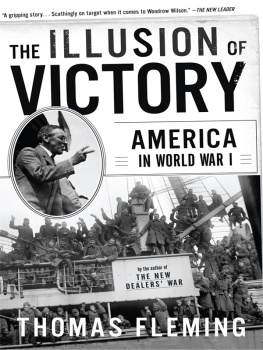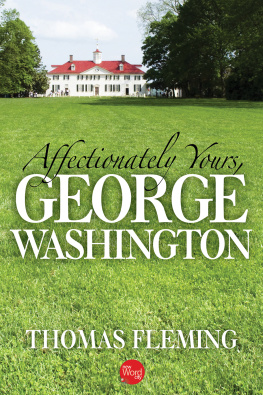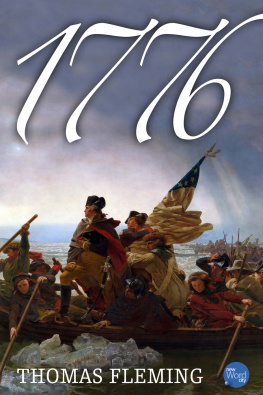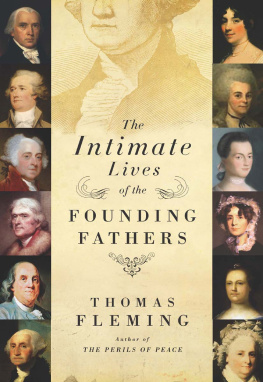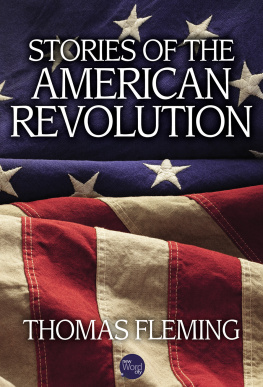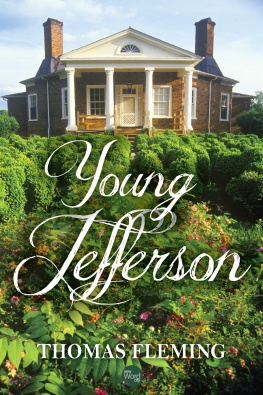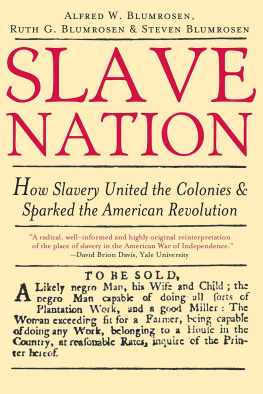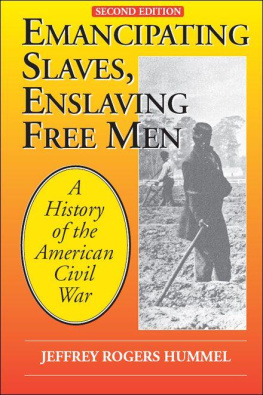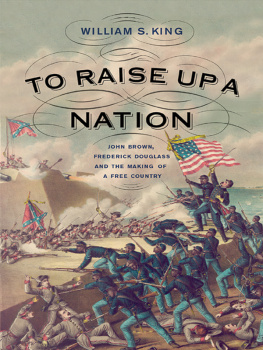A DISEASE
IN THE
PUBLIC MIND
A Disease

Public Mind
A NEW UNDERSTANDING OF WHY
WE FOUGHT THE CIVIL WAR
Thomas Fleming

DA CAPO PRESS
A Member of the Perseus Books Group
New York
Copyright 2013 by Thomas Fleming
All rights reserved. No part of this publication may be reproduced, stored in a retrieval system, or transmitted, in any form or by any means, electronic, mechanical, photocopying, recording, or otherwise, without the prior written permission of the publisher. For information, address Da Capo Press, 44 Farnsworth Street, 3rd Floor, Boston, MA 02210.
Library of Congress Cataloging-in-Publication Data
Fleming, Thomas J.
A disease in the public mind : a new understanding of why we fought the Civil War / Thomas Fleming.
pages cm
Includes bibliographical references and index.
ISBN 978-0-306-82201-8 (e-book) 1. United StatesHistoryCivil War, 18611865Causes. 2. SlaveryPolitical aspectsUnited StatesHistory19th century. 3. Antislavery movementsUnited StatesHistory19th century. 4. Political cultureUnited StatesHistory19th century. 5. New EnglandRelationsSouthern States. 6. Southern StatesRelationsNew England. 7. United StatesPolitics and government18151861. 8. United StatesHistory18151861Biography. I. Title.
E459.F55 2013
973.7'11dc23
2012045309
Published by Da Capo Press
A Member of the Perseus Books Group
www.dacapopress.com
Da Capo Press books are available at special discounts for bulk purchases in the U.S. by corporations, institutions, and other organizations. For more information, please contact the Special Markets Department at the Perseus Books Group, 2300 Chestnut Street, Suite 200, Philadelphia, PA 19103, or call (800) 810-4145, ext. 5000, or e-mail .
10 9 8 7 6 5 4 3 2 1
To AliceFor Everything.
On April 9, 1865, General Robert E. Lees 27,000 gaunt, exhausted soldiers trudged into the village of Appomattox Court House in southern Virginia to find the road ahead of them blocked by thousands of Union cavalrymen. Almost simultaneously, a courier arrived with a message from fleeing President Jefferson Davis, declaring he hoped to fight on. Tell the President that the war is ending just as I have expected it would from the first, Lee replied. The words add retrospective depth to Robert E. Lees inner anguish when he refused command of the Union army in 1861.
Pursuing Lees men was a 120,000-man Union army led by stumpy General Ulysses S. Grant. Sam Grant had recovered from his near defeat at Shiloh to win crucial victories in the western theater. President Lincoln had made him the Union armys commander in chief in March 1864. Like Lee he was a West Point graduate, but his career in the Union army before the war had been undistinguished.
What would the country think if he surrendered, Lee asked his staff officers? One tear-choked young aide replied, There has been no country, General, for a year or more. You are the country to these men.
Lees thirty-year-old artillery commander, General Edward Porter Alexander, spoke for the younger officers. Why not disband the army, order the men to scatter like rabbits and partridges in the bushes?
Here was a moment when a word of assent from Lee would have launched a guerilla war that might have lasted for decades. The men would have no rations, Lee said. Theyd have to rob and plunder.
A little more blood or less now makes no difference, Alexander persisted. Spare the men who have fought under you for four years the mortification of having to ask Grant for terms and have him say unconditional surrender... Generalspare us the mortification of that reply!
Unconditional surrender was the merciless terms that the abolitionists in Congress were recommending. Although it was sometimes invoked when demanding the surrender of a fort or a cityGrant had used it twice in his victories over Confederate armies in the Westit had not been invoked in negotiating peace between warring nations since Rome had demanded it of Carthage in 126 BC.
General Grant will not demand unconditional surrender, Lee assured Alexander. He will give us as honorable terms as we have a right to expect.
West Points spirit of brotherhood played a part in Lees response. Far more influential were words that President Abraham Lincoln had spoken on March 4, 1865, when he was inaugurated for a second term:
With malice toward none; with charity for all; with firmness in the right, as God gives us to see the right, let us strive on to finish the work we are in; to bind up the nations wounds, to care for him who shall have borne the battle, and for his widow and his orphanto do all which may achieve a just and lasting peace among ourselves, and with all nations.
Whether General Lee had read these words, or heard only fragments of them, we do not know. But we can be sure that even fragments would have stirred a profound response in a man who, more than any other soldier, personified the divisions of heart and mind that had begun the war. We know that General Grant had heard the words. In addition, he had conferred with President Lincoln on April 3, when the president visited Richmond after Lees army had retreated from the wrecked Confederate capital.
Grant and Lee met in the Appomattox home of man named McLean. After they chatted briefly, Lee asked if Grant was ready to discuss surrender terms. Grants reply was succinct and simple. The surrendered men would be paroled and disqualified from taking up arms again. Once they gave up their weapons and ammunition, they would be free to return to their homes. They would not be disturbed by the United States authority as long as they observed their paroles.
Lee replied with a request. Could the cavalrymen and artillerymen keep their horses? They all owned them privately. Grant instantly agreed. Anyone who claimed a horse or mule would be allowed to take it home to work their little farms.
This will have the best possible effect upon my men, Lee said. It will be very gratifying and it will do much toward conciliating our people.
Next Lee confessed his men were close to starvation. Grant turned to his commissary general, who was sitting nearby. Within hours, fresh beef, salt, hard bread, coffee, and sugar were flowing into the Confederate lines. As the food arrived, Union army bands began playing and artillery batteries fired victory salutes. General Grant ordered an immediate halt to these celebrations. The rebels are our countrymen again, he said.
On the evening of April 11, 1865, two days after General Lee surrendered, a jubilant crowd gathered in front of the White House and began calling for President Lincoln. Noah Brooks, the reporter for the Sacramento Daily Union who was visiting the president, described the throng as a vast sea of faces, illuminated by the lights that burned in the festal array of the White House, and stretching far out into the misty darkness.
Lincoln appeared at the window over the mansions main entrance, a place from which he and other presidents often spoke. The crowd fell silent. Instead of a few random remarks, Lincoln had a prepared speech. It swiftly became apparent that he was using this opportunity to begin discussing his postwar policy toward the defeated South.
Next page

